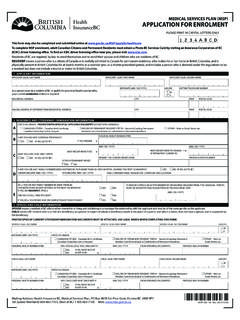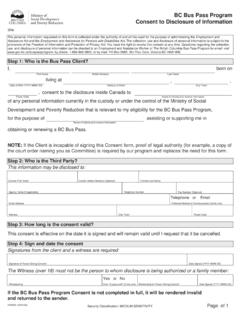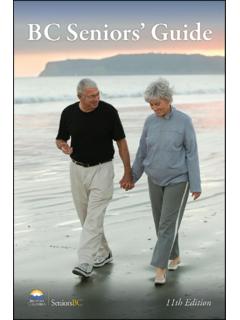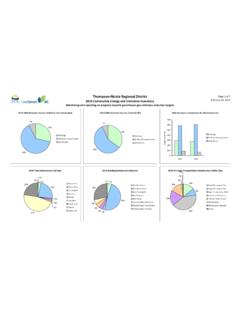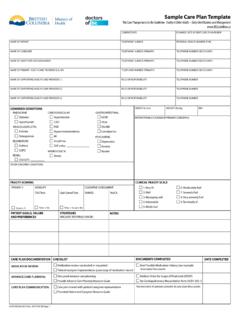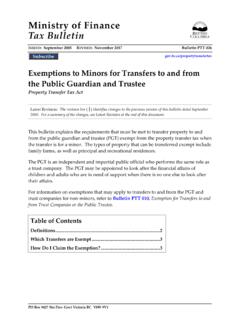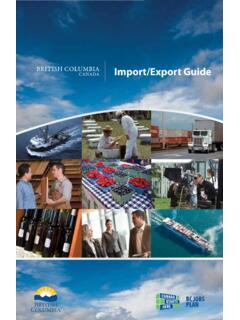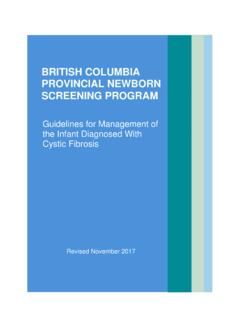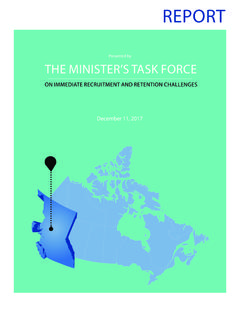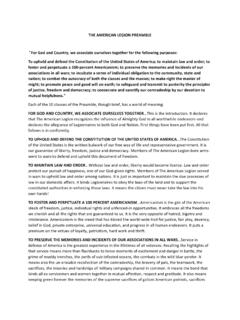Transcription of British Columbia Early Learning Framework A Guide for …
1 British Columbia Early Learning Framework A Guide for Families F. amilies have the most important role in contributing to children's well-being and Learning . Families are the first teachers, the primary caregivers, and the knowledge-holders of their children. Families have the most important role in promoting their children's well-being and Learning . For all communities, Learning often involves more than one generation. Elders and grandparents can be central to Early Learning programs, and their knowledge of cultural traditions and language can can be of great benefit to children, families, educators and community. ( Ministry of Education, 2019, p. 16). Copyright 2020 Province of BC. The Importance of Families Families are their children's first teachers. They are knowledge keepers. They are respected as teachers of culture, heritage, language, and values. Families have a profound impact on the beliefs, knowledge and well-being of children.
2 As families live and learn together , they support their children by: nurturing a sense of well-being and belonging to help their children learn about the world around them providing opportunities to engage with other children, adults, and materials in their homes, environments, and communities creating opportunities to communicate ideas and participate in relationships with others through sounds, gestures and expressive languages such as moving, dancing, constructing, playing, or participating in drama, art, mathematics, science, music, and storytelling nurturing a positive sense of self-worth, self-awareness, and identity so children become confident individuals who contribute to their own well-being, and to the well-being of their family, community and society These four elements are the foundation of the Early Learning Framework . The Early Learning Framework honours what families do to nurture their children's growth and development in their home environments.
3 What is the Early Learning Framework ? The Early Learning Framework is a document written primarily for educators and others involved in and supporting Early Learning , with a focus on children from birth to age eight (approximately grade 3). The Framework is designed to provide guidance for: supporting and enriching children's Early Learning experiences providing a focal point for conversations between families and educators demonstrating how important Early Learning is for children What is the Vision of the Early Learning Framework ? Vision: Respectfully living and Learning together . The Early Learning Framework sets forth a vision that guides Early Learning and is designed to inspire educators, families, and others working with young children. There are many ways that families may already support Early Learning , including: using everyday moments to inquire and wonder encouraging children to explore their interests using play as an opportunity for unexpected Learning 2 British Columbia Early Learning Framework : A Guide for Families What are the Principles of Learning in the Early Learning Framework ?
4 Families and educators are guided by both written and spoken principles of Learning , which grow from experience, values, and culture. The Early Learning Framework is focused on two key sets of principles of Learning : 1. The First Peoples Principles of Learning . These principles come from the shared wisdom of Elders from Indigenous communities throughout British Columbia , and are embedded in the curriculum and the Early Learning Framework . The principles reflect Indigenous perspectives, knowledges, values, and understandings. Learning ultimately supports the well-being of the self, the family, the community, the land, the spirits, and the ancestors. 2. The Early Learning Framework Principles. These principles inspire ways of thinking about childhood and Learning . They support all children, families, and communities. Families have the most important role in contributing to children's well-being and Learning . Involving Families Families can support their child's Early Learning by having conversations with educators to learn more about the Early Learning Framework .
5 Through discussion, educators may ask families questions and share observations about their child. Educators can focus on the families' perspectives and experiences. Families can also ask questions of educators. They can talk about what their child is Learning or experiencing, which may allow the Learning to continue at home. Discussions increase both educators' and families'. understandings of what children are Learning and experiencing. British Columbia Early Learning Framework : A Guide for Families 3. What are the Living Inquiries in the Early Learning Framework ? The Early Learning Framework explores four living inquiries. They refer to the way children, educators, materials and ideas work together as children think and learn. In the Early Learning Framework , living . refers to processes that are ongoing and always evolving. Inquiring refers to noticing or paying attention. The four living inquiries are: Well-being and belonging Engagement with others, materials and the world Communication and literacies Identities, social responsibility, and diversity Each living inquiry in the Early Learning Framework is accompanied by a series of questions that may help educators, families, and others reflect on the choices they make about Learning .
6 4 British Columbia Early Learning Framework : A Guide for Families What can Families do at Home? Families can support the living inquiries at home through a variety of activities. Some examples of activities for each living inquiry are listed below. Well-being and belonging: Share your family story with your child. Talk about what makes your family unique. Expand your family story to create a family tree. Cook with your child, or play pretend cooking. Plan a daily routine and schedule with your child. Invite their ideas for sleep, nourishment and physical activity. Engagement with others, materials, and the world: Introduce or explore instruments or objects with your child. Use them to make sounds and rhythms. Use objects you can find at home or in your community. Explore nature and take your child on walks. Play outside. Notice the seasons and natural things. Create space and time for your child to have unstructured, child-led free play.
7 British Columbia Early Learning Framework : A Guide for Families 5. Communication and literacies: Ask your child about something that they love, or something that brings them joy. Play games with your child, such as boardgames, card games, or movement games. Sing songs, read stories, share rhymes, and dance with your child. Identities, social responsibility, and diversity: Talk to your child about changes that happen every day. Share observations about the weather, blossoming flowers, falling leaves, as well as children's own growing bodies. Help your child identify emotions and talk about them. Encourage your child to use all their senses to the best of their abilities (touch, taste, see, hear, and smell). Help your child to notice and celebrate similarities and differences across families. 6 British Columbia Early Learning Framework : A Guide for Families The Role of Families The Early Learning Framework recognizes that families have the most important role in the development of their children's well-being and Learning .
8 Nurturing a sense of well-being and belonging is based on children's relationship with their families, communities, and their cultures, environments and the world. Families are the first teachers of their children. Through families, children may hear stories, poems, rhythms, chants, and songs that connect to their cultures and traditions. Throughout the Early Learning Framework , educators are encouraged to collaborate, communicate and wonder about children's Learning with families. Families may choose to begin a dialogue with their child's educator to learn more about the Early Learning Framework , and how it supports their child's Early Learning . British Columbia Early Learning Framework : A Guide for Families 7. References Ministry of Education. (2019). British Columbia : Early Learning Framework . Victoria, Ministry of Education. (2019). Let's Play! Activities for Families. Victoria, Ministry of Education. (2019). Play Today: Handbook.
9 Victoria, Ministry of Education. (2020). Play Today: A Guide for Families. Victoria.
